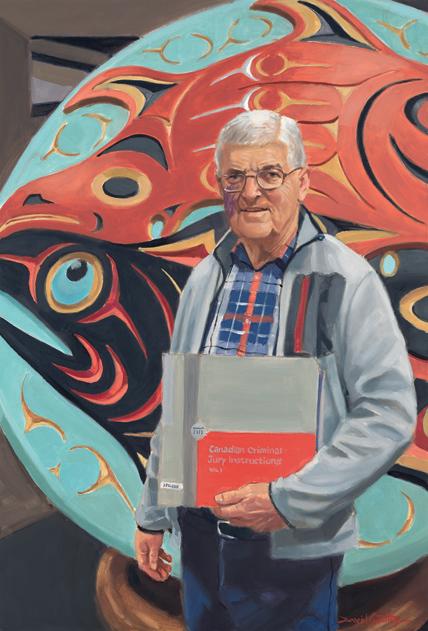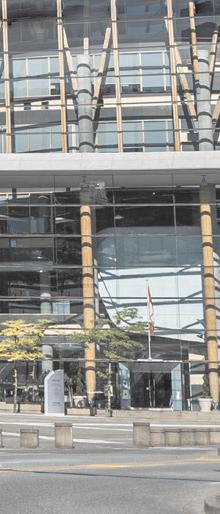
8 minute read
ON THE FRONT COVER GERRY FERGUSON
from May 2023
By Ivan Watson, Julie Sloan and Michelle Lawrence
Distinguished Professor Gerry Ferguson combines the youthful passion and curiosity more commonly associated with a lawyer just beginning his career with the wisdom, humility and “can do” attitude of a confident senior leader in his field who has seen and done it all. Well loved and respected for his many career accomplishments in teaching, scholarship and administrative leadership as well as his dedicated, long-term mentorship of students and younger colleagues, Gerry retired last summer after an incredible 45 years with the UVic Faculty of Law.
“Professor Ferguson is a hugely productive and greatly impactful scholar, whose research has, over his long and distinguished career, advanced our understanding of criminal law in Canada and abroad,” note interim dean of law Val Napoleon and former dean Professor Jeremy Webber. “In addition to everything else, his research production is a model of knowledge mobilization. Not only has he greatly advanced our scholarly knowledge of the criminal law, but also his research continues to shape, each and every day, to an extent beyond that of any other scholar we can think of, the administration of the criminal law in Canada. He has been a treasured mentor to a large number of his junior colleagues.”
Gerry’s early years were spent in snowy Ottawa, far from the February blooms and ocean views that would eventually draw him to Victoria. His academics were encouraged by an attentive mother, who quite remarkably was able to manage her own career as a teacher while raising children on her own in an era with little support for single parents. Gerry surely inherited both her commitment to education and her grit. For a young Gerry Fer- guson, the latter was tested with no shortage of delight on the ice ponds and hockey rinks of our nation’s capital. Fortunately for us in the legal profession, Gerry’s academic interests prevailed over his athletic pursuits, and he eventually hung up his skates in favour of law school. Gerry earned his LL.B. at the University of Ottawa in 1971. He and his new bride Sharon left Ottawa for New York City the following year. There, Gerry completed a master of laws degree at New York University. On graduation, he returned to Ottawa for a research position at the Law Reform Commission of Canada, and later a faculty position at the University of Ottawa.
Building The Faculty Of Law
In 1976, Gerry joined the UVic Faculty of Law during its very first year in existence as an associate professor, recruited by founding dean Murray Fraser, whom he had worked with previously at the Law Reform Commission. “I’d never been to Victoria before, but I had heard that it was a nice place,” Gerry recalls. “I told Murray I’d love to come visit, but there was no chance I was coming there to work. I often say that life is a series of accidents, and 45 years have come and gone now!”
When Murray Fraser, the founding dean of UVic Law, was building the new faculty, “a balance of experienced and younger law professors brought an aspiring young professor from Ottawa,” remembers Murray’s wife, Anne Fraser. “Little did Gerry or his wife Sharon imagine that Victoria would become their home.”
Murray had a vision for a law school that was innovative, with a caring, student-centred focus and a social justice outlook that appealed to Gerry. He deeply admires the values that the Frasers helped to instill into the law school when he started in the 1970s and that carry on to this day, including a commitment to teaching excellence and social justice.
“After all these years, I’d say that the culture of UVic law has largely remained the same, and from the beginning we wanted a new and innovative way of teaching law, and in particular understanding and teaching law as a process,” he says. “What process means is that we wanted to study law not only in books, but also to understand how the law has actually been applied and how it is experienced by those it affects. That also led to us saying that lawyers had to have certain skills beyond analysis, including technical skills like interviewing clients, counselling clients, advocating for clients, etc. So we developed skills courses that were almost non-existent at the time, and we developed experiential or clinical programs such as the Law Centre. That formed the basis of a law school built on the values of social justice and collegiality rather than competition, and encouraged an obligation to give back to the community. All of those things are what makes up the ‘UVic Difference’. I’m proud to say that it carries on to this day.”
Gerry was promoted to full professor in 1981 and served as associate dean for two terms in the 1980s. With a reputation for fairness and integrity, successive deans have relied on him as the go-to person when important tasks had to be accomplished or sensitive issues needed to be managed with tact, discretion and good judgment. Gerry was later awarded the title of distinguished professor, a rank reserved for the most outstanding and truly exceptional. Without doubt, it is a title most fitting.
He led the creation of UVic Law’s Co-operative Education program, the first co-op program at any law school in Canada. “I’m proud of having been able to take a new idea, such as co-op, and guide it through all the steps necessary for approval at the university,” he says. “It was heresy at the time, but the impact has been substantial, and it has also meant that we offer summer programs.”
He was also instrumental in the renaming of UVic’s law building from the “Begbie” building to the “Murray and Anne Fraser Building” in 2001, on the occasion of the faculty’s 25th anniversary.
“I had proposed that we explore the idea of changing the name of the building, and I knew that could be very political,” he recalls. “I started by building up small support in the faculty, the bench and the bar. It wasn’t about denigrating Begbie, and it occurred to me that if we called it the Fraser building, no one was going to object because he was the founder of the law school and deeply respected by everybody. Some may have not have liked moving away from the old name, but the new name was unassailable and more suitable to the school.”
Teacher And Mentor
Gerry has won the UVic Law Students’ Society First Year Teaching Award more often than any other colleague at the UVic law school. His students consistently noted his excellent communication skills, caring attitude, commitment to his students, and infectious enthusiasm and passion for law.
He devoted much of his time to mentoring students and hiring them to assist him with research projects. Forty-five years of law students have benefitted from his exceptional ability as a teacher and kind guidance as a mentor. Many of his former students have noted his considerate yet challenging style in the classroom.
“In Gerry’s four decades teaching criminal law, he has been a popular, admired and respected professor, associate dean and model of the ‘reasonable man,’” recalls Anne Fraser. “Always interested in his students, Gerry earned their admiration in the classroom with his ability to be absolutely up to date on the most recent developments in his areas of the law. The fourth edition of his book on money laundering and global corruption is illustrative of this important ability. His stalwart presence, good judgment, kindness and genuine interest in students and colleagues will be greatly missed and long remembered.”
Changing Criminal Law In Canada
His scholarly interests have been broad, encompassing criminal law, criminal procedure, sentencing, global corruption and mental health law. For decades, he was a primary contributor to the Annual Review of Criminal Law, now in its 40th edition. His most recent ground-breaking book, Global Corruption: Law, Theory and Practice, now in its fourth edition, arose out of his extensive involvement with a UN anti-corruption committee and has been widely cited internationally. The book is free and available on the United Nations and Canadian Bar Association websites, to name a few.
Perhaps his largest contribution to criminal law in Canada began in 1987 when, with the Continuing Legal Education of B.C., he oversaw and coauthored the Canadian Criminal Jury Instructions (“CRIMJI”), which quickly became an authoritative text and indispensable tool for both judges and counsel in criminal litigation cases. He developed it from a purely print publication in its early days to an accessible, online and fully searchable publication consisting of 156 individual chapters and over 2,400 pages.
“CRIMJI is widely used by judges in many areas to help them prepare when they have to tell the jury what the law is before they go into to the jury room and it is something I’m proud of,” says Gerry. “I hope to continue to work on it for a while. I consider it my largest and most impactful scholarship in the field.”
For scholars, jurists and practitioners of criminal law in Canada, the impact of Gerry’s work is unquestionable. His research spans the enactment of the Charter, and his ideas have shaped the foundations of modern criminal law. They will no doubt continue to impact the trajectories of the justice system for decades yet to come. It is not surprising, given the volume and quality of his scholarly contributions, that Gerry would be recognized by one of our most celebrated jurists as “an icon in the realm of criminal law” and one to whom Canadians owe “a huge debt of gratitude”.
Forging Equity And Diversity Practices
Gerry has shown exemplary leadership in forging equity policies and practices in both the law school and the B.C. legal community.
In the early 1990s, he wrote a 50-page report and helped to establish what became the Law Society of British Columbia’s Equity and Diversity Committee, which was the first such committee for any law society in the country. He was an active leader on the committee from 1993–2004, and during that time he led the creation and authorship of three reports on Aboriginal law equity concerns in respect to students and lawyers.
Over several years in the 1990s, he led faculty committees at the law school that developed a number of equity policies designed to foster equality and promote inclusivity for people and populations historically excluded from the law and legal education. These policies established the UVic Faculty of Law as a leader in the pursuit of equity and diversity values and were used as models for other parts of the university and other Canadian law schools.
Gerry has also served the profession in national and international leadership roles, including as member of the National Advisory Council, Law Commission of Canada, International Society for Reform of the Criminal Law, and as a senior associate of the International Centre for Criminal Law Reform and Criminal Justice Policy.
Looking Ahead
Gerry is rightly proud of all that he has achieved during this time at UVic Law. “I’ve tried to contribute to the law faculty in every way I could through my scholarship, teaching and impact on the faculty and community,” he says. “I’d like to be remembered as someone who was respected for his integrity and selflessness. My goal has always been to contribute as fully as possible, to the best of my ability, to do things in the faculty interest rather than in my individual interest.”
Gerry welcomes retirement for the time it will give him for travel with his beloved Sharon and their daughters and granddaughter. He has consistently described his many adventures abroad with Sharon—for both work and play—as among their happiest times. They have made the occasional return trip to Ottawa in recent years but their sights are set now on warmer climes, with Costa Rica being the family’s new favourite destination.
But friends and colleagues won’t let Gerry go easily. He has been recruited to join the BC Access to Justice Centre for Excellence as a mentor, and in his retirement he has already had a hand in advising graduate work on human rights in the correctional setting. He has agreed to review pending research on the new extreme intoxication defence, and he has been scheduled to complete more updates yet of CRIMJI. Of course, given his hard work ethic, his avid curiosity and his enduring passion for the criminal law, Gerry is easy to convince.
















